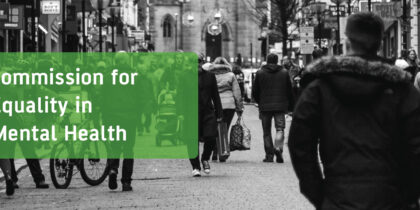By Alethea Joshi and Andy Bell
Last week, the CQC published findings which show that people’s experience of adult community mental health services in England is the poorest in many years.
The report notes the impact of Covid-19 on both services and people trying to access them. For instance, 48% of respondents said that their mental health had deteriorated as a result of changes to their care. And while experiences of accessing support through video conferencing were better than average, recipients of telephone-based support reported poorer experiences across a range of areas. This reinforces our findings on the pandemic’s impact: that whilst use of digital technology has expanded access to care for some people, there is a very clear and real need for face-to-face support, and for a flexible offer within services.
Referrals to crisis care services rose by an average of 11% per CCG area. This may indicate an increase in the number of people needing urgent mental health support, possibly as a result of difficulties in getting access to ‘lower-level’ care earlier on. This strongly suggests that investment is needed in community services that can prevent crises from happening in the first place, as well as immediate help when it’s needed most urgently.
Almost half of respondents said that services were always there when they needed them, whilst 17% said they were not. A further 42% of people said they waited too long to receive talking therapies. Many of these findings once again reveal the immense pressure on the system – a pressure that is only set to increase. As the pandemic’s impact heightens mental health need, pressure and stress among staff are growing. We are already seeing the knock-on effect on the workforce, with mental health-related absences among all NHS staff rising by almost 40% earlier this year. The mental health workforce is growing as the NHS Long Term Plan is being implemented, but it has only recently recovered from years of austerity and there’s a long way to go to reach the levels needed to meet growing demand. To weather this ‘perfect storm’, it is vital that the NHS both invests in wellbeing support for staff, and delivers on its workforce pledges.
We know that at least 46% of people with a mental health problem also live with physical health issues; yet 39% of respondents to the CQC survey said they did not receive support with their physical health needs. Equipping mental health services to holistically address people’s needs is a vital step towards achieving parity which has been set back by the pandemic. The survey found that only “23% of people on a GP severe mental illness register [were] given a physical health check… a reduction of 13% when compared with the 2019/20 figure”. Turning this around will be important to lay the foundations for improved physical health support.
The CQC findings also highlight a worryingly fragmented approach to people’s mental health. Only half of respondents felt the person they saw for mental health support recognised how their mental health affected other areas of their lives. Almost half reported not receiving help or advice in accessing support with finances, benefits or employment support. Our work has repeatedly demonstrated the importance of effective welfare support and employment support (IPS). The CQC’s findings once again highlight that any mental health intervention, no matter the quality, will have limited impact if the inequalities, injustices and social circumstances surrounding a person’s wellbeing are not simultaneously addressed.
Mental health services have worked hard, often against the odds, to sustain support throughout the pandemic. The CQC survey shows just how challenging that has been and continues to be for many. Investment promised in the Long Term Plan must be delivered and translated into increased capacity in services that offer holistic and engaging support where and when it’s needed.








